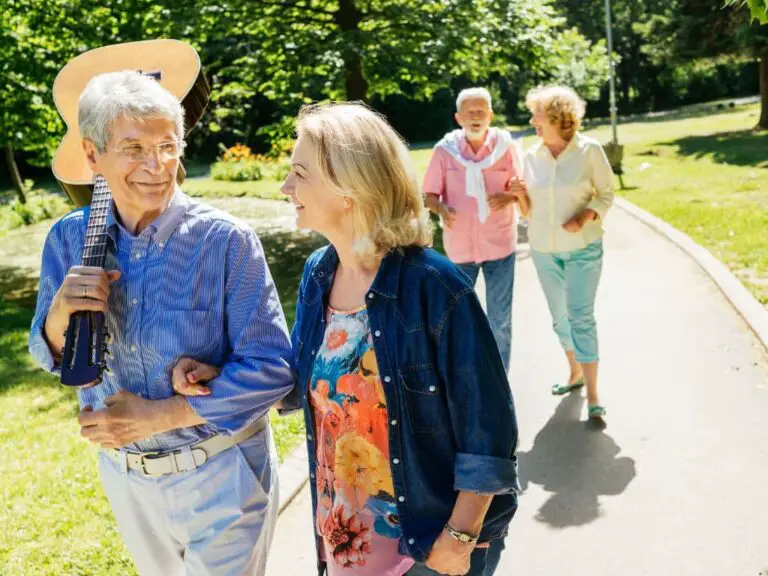What Is the Organization For Senior Citizens Called?
The organizations for senior citizens vary globally and include both non-profit and governmental bodies. In the United States, notable organizations include the American Association of Retired Persons (AARP), the National Council on Aging, and the Meals on Wheels Association of America. In other parts of the world, there are organizations like the German National Association of Senior Citizens’ Organizations, AGE Platform Europe, and HelpAge India.

What Is a Senior Citizen Organization?
A Senior Citizen Organization is a private or public organization, typically non-profit, that is primarily formed to support senior citizens, who are usually defined as individuals aged fifty-five or older. These organizations operate with the goal of providing recreational, social, and sometimes health services to older adults. They often run multipurpose senior citizen centers, which serve as community hubs for senior citizens to socialize, participate in activities, and access various services.
Senior Citizen Organizations can take various forms such as senior citizen centers, group homes, or housing projects. Senior citizen centers are communal places where seniors can gather for group activities, social support, public information, and other purposes. A senior citizen group home is a residential facility for elderly people where they can live in a community environment with support services. Senior citizen housing projects, on the other hand, are residential spaces specifically designed or reserved for seniors, often offering amenities, activities, and services tailored to their needs.
In the context of legislation and regulation, these organizations are subject to specific rules and requirements regarding their operations, licensing, and the activities they conduct. For example, they may be allowed to conduct bingo occasions under certain conditions, and may apply for exceptions to conduct more than the standard number of such occasions.
While the exact services and activities provided by a Senior Citizen Organization can vary widely, they all share a common purpose of enhancing the quality of life for senior citizens, promoting their independence, and ensuring their needs and interests are met. They play a vital role in addressing issues related to aging and retirement, and in advocating for the rights and well-being of senior citizens.
What Is the Purpose of a Senior Citizen Organization?
A Senior Citizen Organization is a group or institution primarily designed to cater to the needs of senior citizens, individuals typically aged 55 or older. These organizations can take various forms including senior citizen centers, senior citizen group homes, or senior citizen housing projects.
The main purpose of a Senior Citizen Organization is to support senior citizens by providing them with social, recreational, and health services. These organizations often serve as community hubs where seniors can participate in various activities, socialize, and access essential resources. They offer a variety of programs such as exercise classes, arts and crafts, health workshops, and other educational programs aimed at promoting physical health, mental well-being, and social interaction among seniors.
In the case of senior citizen group homes or housing projects, these organizations provide a safe and comfortable living environment for seniors. They may offer additional services such as meal preparation, assistance with personal care, transportation, and medical services.
A Senior Citizen Organization can be a private or nonprofit entity. Nonprofit organizations typically operate on funding from donations, grants, and fundraising activities, while private organizations may charge for their services. Regardless of their structure, these organizations play a crucial role in promoting the welfare and quality of life of senior citizens.
These organizations also advocate for the rights and needs of senior citizens at a policy level. They may work to influence legislation and social policies affecting seniors, raising awareness about issues such as elder abuse, healthcare, housing, and income security.
List of Senior Citizen Organizations
AARP (American Association of Retired Persons)
AARP (formerly known as the American Association of Retired Persons) is an American interest group focusing on issues affecting individuals over the age of fifty. Founded in 1958 by Ethel Percy Andrus, a retired educator, and Leonard Davis, the founder of the Colonial Penn Group of insurance companies, AARP has grown to become an influential lobbying group in the United States with more than 38 million members as of 2018.
AARP originated from the National Retired Teachers Association (NRTA), which was established by Andrus in 1947 to promote health insurance for retired teachers. Over the years, the organization expanded its insurance benefits to the general population aged 55 and older. Today, the NRTA is a division within the AARP.
The organization advocates for older Americans on a number of federal health and fiscal issues, including Medicare and Social Security. AARP also fights against age discrimination in the workforce, lobbies for lower prescription drug prices, and educates seniors about consumer fraud. Other services offered by AARP include legal assistance, tax preparation, job training, and personal finance through its affiliated organizations such as the AARP Foundation.
Members of AARP receive the AARP Magazine and the AARP Bulletin, which are among the highest-circulation publications in the United States, along with special offers and discounts related to travel, restaurants, prescriptions, and more. AARP licenses its brand to certain products, including Medicare insurance with UnitedHealthcare.
In addition to its advocacy work, AARP has been involved in several controversies and lawsuits, including an investigation into its financial interests and hiring practices in 1995, and class action lawsuits regarding insurance policies in 2018 and 2019. Despite these challenges, AARP continues to be a significant influence in American policy and advocacy for older adults.
Age International
Age International is a UK-based charity founded on 24 April 2012 by Age UK and HelpAge International. The organization focuses on improving the lives of older people in over 30 low and middle-income countries. Its four priority areas of work include poverty reduction, improving health, protecting rights, and emergency relief. The charity is a subsidiary of Age UK and is the UK affiliate of the HelpAge Global Network, which consists of over 100 ageing organizations in more than 70 countries. Age International also has a unique role in disaster relief, as it is the only aid organization within the Disasters Emergency Committee (DEC) to specifically target older people in emergencies.
The charity’s director is Chris Roles, who actively blogs about ageing-related topics on the Huffington Post. Age International has responded to several major crisis appeals since its founding, including the Philippines Typhoon, the Gaza crisis, the Syria crisis, the Ebola crisis, the Nepal earthquake, the Yemen crisis, and the East Africa Crisis. It also publishes research and reports on ageing and development, and organizes events and campaigns to raise awareness and funds for its cause. The charity is associated with a number of celebrities, politicians, academics, and development experts who support its work.
Help Age International
HelpAge International is a non-governmental organization (NGO) founded in 1983 by five organisations from Canada, Colombia, Kenya, India, and the United Kingdom. It is dedicated to assisting older people worldwide to claim their rights, challenge discrimination, and overcome poverty. The organization’s mission is to enable older individuals to lead dignified, secure, active, and healthy lives.
The international headquarters is located in London, and it operates through the HelpAge Global Network, which comprises over 170 members spanning 90 countries. HelpAge International’s work involves lobbying governments for policy change, conducting research programmes, and implementing community projects. It focuses on various issues affecting older people globally, including disaster risk reduction and climate change, rights, health, social protection, work, and the distribution of COVID-19 vaccines.
In response to natural disasters and other humanitarian crises, HelpAge works with local partners to provide emergency relief, health care, and other forms of support to older people. The organization actively promotes the development of a United Nations convention on the rights of older persons. It engages in advocacy and lobbying efforts at both national and international levels, aiming to raise awareness about the need for such a convention and ensure the rights and needs of older people are considered during its drafting.
HelpAge International also works alongside its members and partners to promote the inclusion of older people in the development of the convention. It also provides training and capacity-building to older people and their organizations. The organization also conducts research and produces publications and other resources to support the drafting of the convention.
International Federation on Ageing
The International Federation on Ageing (IFA) is a non-governmental organization based in Toronto, Ontario, Canada. Founded in 1973, its work is centered on ageing, older persons and related issues such as ageism. The IFA aims to bring together NGOs, the corporate sector, academia, government, and individuals to improve the quality of life of older people worldwide. This is achieved through stimulating, collecting, analyzing, and disseminating information on rights, policies and practices.
The IFA was formed following a meeting of representatives from thirteen nations at the London School of Economics. They sought to create an international organization to promote information exchange on ageing. The IFA was instrumental in calling for the first World Assembly on Ageing in the early 80s, which resulted in the world’s first International Plan of Action on Ageing.
The IFA has General Consultative Status at the United Nations Economic and Social Council (ECOSOC), the World Health Organization (WHO), the International Labour Organization (ILO), UNESCO and other international agencies. It is also represented on the UN Committee for Human Rights, the UN Committee for the Older Women and UNESCAP (Economic and Social Commission for Asia and the Pacific).
The organization’s headquarters were transferred from Montreal to Toronto, Ontario, Canada in March 2009.
National Council on Aging
The National Council on Aging (NCOA) is a non-profit organization based in Arlington, Virginia, serving the United States. Established in 1950, it was the first charitable organization in the U.S. specifically established to advocate for older Americans. NCOA works with service providers, policymakers, businesses, and governmental agencies to ensure older Americans have access to jobs, benefits, healthcare, and options for independent and active living.
The council provides a range of services to older people and their caregivers. These include Benefits Checkup, an online tool that connects older adults with benefits they may qualify for; Economics Checkup, a tool that helps older adults manage their budget and save money; and My Medicare Matters, an educational service about Medicare options. The organization’s mission is to improve the lives of millions of older adults, especially those who are struggling. Its work is centered around improving the health and economic security of 10 million older adults by 2020.
American Seniors Association
The American Seniors Association (ASA) is a conservative organization established in 2009 as an alternative to the American Association of Retired Persons (AARP). The ASA was founded following AARP’s public support of Obamacare, leading to more than 30,000 Americans cancelling their AARP memberships and joining the newly formed ASA. The organization is intended to serve as a voice and reliable resource for conservative Americans aged 50 and older, a demographic that makes up more than a third of the American population.
The ASA’s mission is to provide choices in benefits, products, and representation for America’s 50+ population. It aims to rebuild national values respecting America’s seniors, ensuring their freedom and independence in various aspects of life, including employment, retirement, health care, lifestyles, and housing. The organization also advocates for the safety and protection of seniors, standing against defunding the police and supporting police and military organizations across America.
Over the years, the ASA has prioritized the individual American senior over big insurance or pharmaceutical companies, advocating for the freedom and rights of the older American population. It has joined forces with other conservative organizations to advocate for seniors on Capitol Hill. The ASA emphasizes the respect, admiration, and support that America’s 50+ population have earned for their contributions to building families and enhancing American life.
The Senior Citizens League
The Senior Citizens League (TSCL) is one of the largest nonpartisan organizations in the United States dedicated to promoting and defending the rights, freedoms, and benefits of senior citizens. Originally established as a special project of TREA: The Enlisted Association, TSCL became an independent 501[c][4] citizens’ action organization on January 1, 1995.
The organization’s primary mission is to educate senior citizens about their rights and freedoms as U.S. citizens and to protect the benefits they have earned and paid for, including Social Security, Medicare, and veteran or military retiree benefits. To achieve this, TSCL distributes public awareness and educational materials, disseminates information about legislation before Congress, enlists senior citizens in grassroots lobbying campaigns on issues affecting retirees, and ensures that governmental bodies fulfill their commitments to senior citizens.
TSCL supporters are offered special benefits such as participation in efforts to protect their Social Security and Medicare benefits, access to helpful and money-saving information, and subscription to The Social Security & Medicare Advisor newsletter. The TSCL Board of Trustees and staff are all dedicated to enhancing the quality of life for the nation’s senior citizens through their services.
Alliance for Retired Americans
The Alliance for Retired Americans (ARA) is a non-profit, nonpartisan organization founded in 2001 by the AFL-CIO. It is composed of retired trade union members and non-union, community-based activists, with its predecessor organization being the National Council of Senior Citizens (NCSC). The ARA’s membership spans across all 50 states, comprising former teachers, industrial workers, health care workers, state and federal government workers, construction workers, and community leaders. As of 2020, it boasts 4.4 million members nationwide and has state programs in 39 states.
The ARA’s primary mission is to advocate for social and economic justice, full civil rights, personal and family fulfillment, and a secure and dignified retirement for all Americans. In its early years, the organization was instrumental in promoting health insurance for the poor and indigent, and later, in passing legislation for national health insurance for the elderly, a crucial precursor to Medicare.
The ARA is politically active, often clashing with other groups such as the AARP on issues like Medicare prescription drug benefits. It also takes a stand on matters like Social Security privatization-reform and budget proposals that could impact Social Security benefits. The ARA is governed by its members, who meet in a national convention every non-presidential election year. Its day-to-day operations are overseen by four executive officers and an executive director. The organization also sponsors the Alliance for Retired Americans Educational Fund, which conducts research on public policy issues of importance to retired citizens.
What Services Do Senior Citizen Organizations Offer?
Senior Citizen Organizations offer a wide range of services aimed at promoting the quality of life, independence, and overall well-being of individuals aged fifty-five and older. These services can vary significantly among different organizations but they generally include recreational, social, and health-related services.
Recreational services often involve the organization of group activities that encourage social interaction and engagement among senior citizens. These activities can take place in senior citizen centers, which serve as community hubs where seniors can gather for social support and public information. Activities might include games, crafts, educational classes, outings, and fitness programs designed to cater to the interests and abilities of older adults.
Social services provided by Senior Citizen Organizations often include opportunities for socialization and community engagement. These services may involve communal meals, volunteer programs, and support groups that help seniors stay connected with their communities. Some organizations also offer counseling and advocacy services to help seniors navigate various issues related to aging and retirement.
Health services are another key area of focus for many Senior Citizen Organizations. These may include health screenings, wellness programs, and access to healthcare professionals. Some organizations also offer supports for mental health, such as counseling and therapy services.
In addition to these services, Senior Citizen Organizations often operate senior citizen group homes and housing projects. These provide residential facilities where seniors can live in a community environment with access to support services. These housing options are often designed or reserved specifically for seniors, offering amenities and services tailored to their needs.
Senior Citizen Organizations also play a crucial role in advocating for the rights and well-being of senior citizens. They may work to address issues related to aging and retirement and to influence legislation and regulation that affects senior citizens.
How to Join a Senior Citizen Organization?
Joining a Senior Citizen Organization typically involves the below steps.
- Identify an Organization: The first step is to identify an organization that caters to your needs, interests, and geographical location. You can find senior citizen organizations through online search engines, local community bulletins, or through recommendations from friends or family.
- Understand the Organization’s Services: Once you have identified an organization, it is important to understand the services they provide. Senior Citizen Organizations can offer a range of services from recreational activities, social support, public information, health services, and housing facilities. Choose an organization that provides the services that you are interested in.
- Check Eligibility: Senior Citizen Organizations are typically meant for individuals aged fifty-five or older. However, some organizations might have different age requirements or other criteria. Ensure you meet the eligibility requirements before proceeding.
- Contact the Organization: Reach out to the organization to express your interest in joining. This can be done through email, phone call, or visiting their physical location if one exists.
- Application Process: The organization will guide you through their application process. This might involve filling out an application form, providing proof of age, and possibly undergoing an interview or assessment.
- Understand the Rules and Regulations: Senior Citizen Organizations are subject to specific rules and regulations. It’s important to understand and agree to these rules before joining.
- Membership Fees: Some organizations might require a membership fee. The fee structure can vary widely between organizations, with some offering a sliding scale based on income or waiving fees for those who cannot afford them.
- Participation: Once you have successfully joined the organization, participate in the activities and services they offer. This is a great way to socialize, stay active, and enhance your quality of life.
Frequently Asked Questions
-
What is the organization of senior citizen called?
Answer: Senior Corps is made up seniors over 55.
-
What is the Republic Act of senior citizen?
REPUBLIC Act No. 7432 AN ACT MAXIMIZING THE CONTRIBUTIONS OF SENIOR CITIZENS FOR NATION BUILDING GRANT BENEFITS, SPECIAL PRIVILEGES and OTHER PURPOSES.
-
What is Republic Act 9994 all about?
The law 9994 states that the head of the Office of Senior Citizens Affairs shall be appointed in the interests of seniors and may not be removed, replaced or incapacitated except to ensure the safety of other senior citizens.
-
What is the goal for senior citizen?
The ideal goal for an aging person in your family is to choose a goal they are passionate about and can put a lot of energy into. These are some great senior goals: Fitness and health. For example, aim to exercise three days a week for at least 30 minutes.
-
What is the Expanded senior citizen Act of the Philippines?
The Expanded Senior Citizens Act 2003 was enacted in fulfillment of the constitutional mandate to provide benefits for the aged.
-
What is senior citizen welfare scheme?
Indira Gandhi National Old Age Pension scheme (IGNOAPS), a monthly pension in the amount of Rs. Senior citizens 60-79 are eligible for a 200/- pension. Pension increases to Rs. After reaching the age of 80, your monthly pension will increase to Rs. 500. There are 221,000 beneficiaries in total under this scheme.
-
What are the rights and privileges of the elderly sector under the Expanded senior citizens Act?
Senior citizens with the ability and desire to work or re-employed shall receive information and matching services that will enable them to contribute to society. The terms of employment must comply with all applicable laws and rules, including the Labor Code as amended.
-
What is the intention of RA 11361?
A law ensuring the continuous and uninterrupted transmission and distribution of electricity and the protection of the integrity and reliability of power lines, as well as imposing penalties for violations thereof.
-
Which of the following schemes is used by senior citizens for retirement planning?
National Pension Scheme (NPS). The NPS was introduced in 2004 by the Pension Fund Regulatory and Development Authority of India. The government’s pension plan is specifically designed for senior citizens post-retirement.
-
How does the government take care of the elderly?
Medicare. Medicare, a Federal Government insurance program covering medical expenses for those 65 years and over and all patients with advanced kidney disease. For those who are eligible for Social Security Disability Income for 24 months, it will pay some of the medical expenses.
-
What is the purpose of RA 10640?
10640 is entitled “An Act to Strengthen the Anti-Drug Campaign Of the Government”, amending for the Purpose of Section 21 of Republic Act No. 9165 also known as The Comprehensive Dangerous Drugs Act of 2002 was enacted to amend Section 21 of RA No.
-
What is RA 9994 all about?
Republic Act No. 9994, an Act providing additional benefits and privileges for senior citizens. 7432 as amended. Also known as An Act To Maximize Senior Citizens’ Contribution to Nation Building, Grant Benefits, Special Privileges, and Other Purposes.
-
What is Republic No 11223?
The Universal Health Care Act 11223, or the Universal Health Care Act (or the Universal Health Care Act), mandates institutionalization of the health technology assessment (HTA). This is a transparent and fair priority setting process that will be recommended to DOH and PhilHealth in order for them to develop policies, programs and regulations and determine a beneficiary.
-
What is Republic Act 9257 all about?
Additional privileges are granted by RA 9257, including the right to employment and free training. To assist senior citizens with their health care, the DoH issued an Administrative Order.
-
What are the benefits and privileges of the senior citizens?
Senior citizens who earn minimum wages are exempt from income tax. PhilHealth mandatory coverage. GSIS/SSS retirement benefits. You can get priority or express lanes in nearly all commercial and commerce establishments.






